精编七年级英语下册 情态动词拔高课讲义 (新版)人教新目标版
2017_2018学年七年级英语下册现在进行时拔高课讲义(新版)人教新目标版.doc

2017_2018学年七年级英语下册现在进行时拔高课讲义(新版)人教新目标版现在进行时【key points 】现在进行时用法①表示现在(说话瞬间)正在进行的动作②表示现阶段正在进行的动作现在进行时构成构成:be + v-ing 现在进行时标志词现在:now,at the moment,look,listen,right now 现阶段:this month/ week,these days/ weeks / months 现在进行时语境【exercise】一、填空1. Look! They (play) on the playground. 2. Listen! The baby (cry). 3. Shh! My sister (sleep). Dont disturb her. 4. Where is Allan? He (water) flowers in the garden. 二、单选。
1. Listen, they about Im a Singer. Lets join them. OK. Lets go. A. have talked B. are talking C. talk D. talked2. Its eight oclock. The students an English class. A. have B. having C. is having D. are having3. The kite high in the sky now. It looks like a big bird. A. has flown B. is flying C. was flying D. flew4. Allan, turn down the TV, please. I on the phone. Oh, sorry. A. have talked B. talked C. am talking D. talk 现在进行时句式变换Lucy is watching TV now. 否定Lucy is not watching TV now. 一般疑问Is Lucy watching TV now? Yes, she is. / No, she isnt. 特殊疑问What is Lucy doing now? 【exercise】一、单选1. The old man is a newspaper. A. read B. looking at C. reading D. watching 2. What yourfamily doing beside the lake? Theyre planting trees. A. is B. does C. are D. can 3. are the foreigners doing now? Theyre doing Chinese Kung fu. A. What B. Where C. When D. How 4. Is Xiaoqiang doing his homework? . A. No, he doesnt B. Yes, he is C. Yes, he does D. Yes, he isnt 二、句式变换1. Kim is riding her new bike. (就划线提问) 2. The children are singing on the hill. (就划线提问) 3. Miss Yang is talking with Mr. Wu. (就划线提问) 动词如何变现在分词形式( (- - ing) 直去双改1. 直接加ing 2. 去掉末尾不发音的e 再加ing 3. 以重读闭音节结尾的双写末位字母再加ing 4. 以ie 结尾的动词改ie 为y 再加ing 【小试牛刀】talk put have die clean 现在进行表将来等特殊用法fly eat swim leave sleep 1. 有些动词用进行时(-ing) 的外衣表示将来的含义,用以表达一个最近的计划或安排。
人教版英语七年级下册 Unit1 情态动词can 的用法 课件
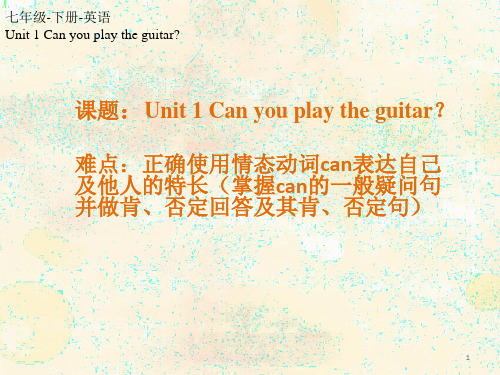
Can they swim? Yes, they can . No, they can’t .
14
Can 的一般疑问句形式:
I you she
Can + he + V原(sing/dance/…)?
it we they
15
Can的肯定及否定回答:
I you she
Yes, he can.
it we they
Name Tony
can sing and dance
can't play the guitar
Eg: In my group, I can draw,but I can't swim. Tony can
sing and dance, but he can't play the guitar. 18
七年级-下册-英语 Unit 1 Can you play the guitar?
课题:Unit 1 Can you play the guitar?
难点:正确使用情态动词can表达自己 及他人的特长(掌握can的一般疑问句 并做肯、否定回答及其肯、否定句)
1
STRUCTURE
Warm-up
Presentation
Pair work
Group work
Homework
Summary
Practice
2
动 词
3
Presentation
Enjoy some pictures
4
I can sing.
5
They can speak Engl.ish.
6
She can't dance.
7
(部编本人教版)最新七年级英语下册 情态动词拔高课作业 (新版)人教新目标版【经典练习】
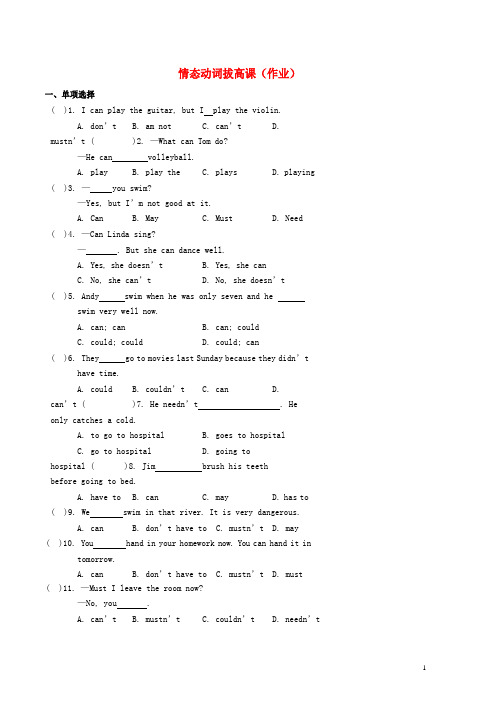
情态动词拔高课(作业)一、单项选择( )1. I can play the guitar, but I play the violin.A. don’tB. am notC. can’tD. mustn’t ()2. —What can Tom do?—He can volleyball.A. playB. play theC. playsD. playing ( )3. —you swim?—Yes, but I’m not good at it.A. CanB. MayC. MustD. Need ( )4. —Can Linda sing?—. But she can dance well.A. Yes, she doesn’tB. Yes, she canC. No, she can’tD. No, she doesn’t( )5. Andy swim when he was only seven and he swim very well now.A. can; canB. can; couldC. could; couldD. could; can( )6. They go to movies last Sunday because they didn’t have time.A. couldB. couldn’tC. canD.can’t ()7. He needn’t. He only catches a cold.A. to go to hospitalB. goes to hospitalC. go to hospitalD. going tohospital ( )8. Jim brush his teethbefore going to bed.A. have toB. canC. mayD. has to ( )9. We swim in that river. It is very dangerous.A. canB. don’t have toC. mustn’tD. may ( )10. You hand in your homework now. You can hand it in tomorrow.A. canB. don’t have t oC. mustn’tD. must ( )11. —Must I leave the room now?—No, you .A. can’tB. mustn’tC. couldn’tD. needn’t( )12. I speak to you for a moment?A. MustB. MayC. NeedD. Do ( )13. —May I swim in the river alone?—No, you . It is very dangerous.A. canB. couldn’tC. may notD. mustn’t二、完成句子14.Can you speak English?(作否定回答)15.He can play the piano.(改为一般疑问句)16.He can sing and dance.(就划线部分提问)17.We have to wear school uniforms on school days.(改为一般疑问句)18.Does your brother have to stay at home?(作否定回答)19.我们现在必须得走了。
【拔高教育】七年级英语下册 unit 10 i’d like some noodles短语、语法知识点汇总 (新版)人教新目标版
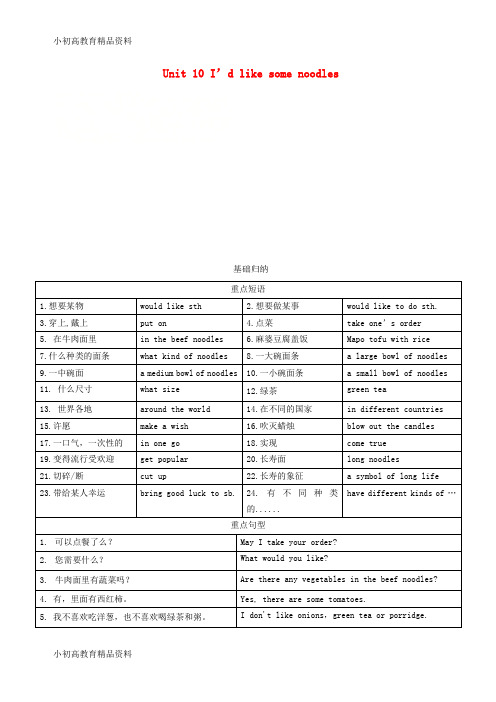
Unit 10 I’d like some noodles基础归纳【教材内容解析】Section A1.What would you like? (P. 55)would like表示“想要”,相当于want,后接名词、代词或者动词不定式作宾语。
I would like a cup of tea now.2.I’m not sure yet. (P. 55)(1) sure的用法① be sure of/about sth. 对……确信Are you sure about the news?② be sure to do sth. 确保做某事Be sure to lock the door when you leave home.③ be sure that....确信……I am sure that he will come soon.④ make sure that...确保……Make sure that you can finish the job on time.(2)yet此处用作副词,表示“还、仍然”,常用于否定句和疑问句中。
Is everything ready yet?3. ---Are there any vegetables in the beef noodles?---Yes, there are some tomatoes. (P. 55)some一般用在肯定句中;any一般用在否定句、疑问句中。
例句:There are some birds in the tree. 例句:Do you have any questions?特殊情况:some可以用在疑问句中,表达“建议、请求、邀请” 并希望得到对方的肯定回答例句:Would you like some tea? 例句:Can I have some oranges?4.May I take your order? (P. 56)本句是服务员询问顾客是否点餐的常用交际语,order此处用作名词,表示“点菜”。
新目标(人教)七年级下册英语教学课件 Unit1 Section A(GF-3c)
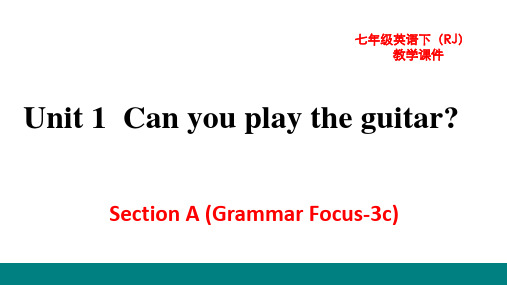
What can you do?
I can dance./I can’t sing.
What club do you want to join? We want to join the chess club.
助动词
实义动词
观察左栏句子,最后一句和前面 的句子有什么不同?
What club do you want to join? 这句话为含有实义动词want的一般现在时的句式结构。
can表“能力”用法 can表示能力时,意为“能;会”。“can+动词原形”表示
“(某人)能/会做某事”,其否定形式为“can’t/cannot+动
词原形”,表示“(某人)不能/不会做某事”。
➢I can play basketball, and my brother can play football. 我会打篮球,我哥哥会踢足球。
否定句
一般疑 问句
He can play the piano. 他会弹钢琴。
主语 + can’t/cannot + 动词原形+其他.
He can’t/cannot play the piano. 他不会弹钢琴。
Can + 主语 + 动词原形 + 其他? 肯定回答:Yes, 主语 + can. 否定回答:No, 主语 + can’t.
Read the poster.
学校(文艺)表演招募学生 show n. 演出;节目 v. 给……看;展示
play sing tell dance
Students Wanted for School Show
We want students for the school show. Can you
人教版新目标 初中英语 七年级英语下册说课稿
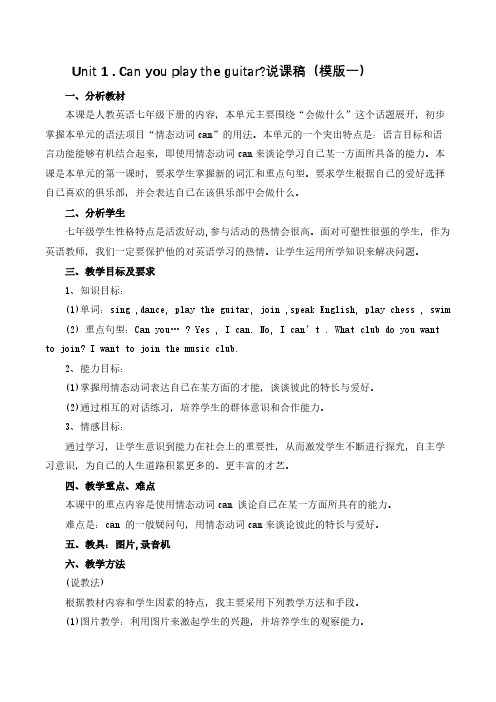
一、说教材 1.教材分析 本单元的核心教学内容是“谈论自己在某方面所具有的能力”(Talking about abilities),整个单元的内容都是围绕情态动词 can 展开的。通过本单元的学习,使学生能 够运用情态动词 can 表达自己某一方面所具有的才能,谈论自己的喜好与意愿,能自荐或参 加各种课外俱乐部,并制作海报而且学会写出招聘广告。并让学生在实践中学会和使用目标 语,鼓励学生积极参加稳中有降种课外各种文体活动,培养学生的多方面才华及团队精神。 而本课是这一单元的第一课时,通过对本节课词汇和句型的学习,学生能够运用所学知识去 表达他们能做些什么,并能开展为参加兴趣小组的调查活动,通过以上活动的开展为后面的
一、分析教材 本课是人教英语七年级下册的内容,本单元主要围绕“会做什么”这个话题展开,初步 掌握本单元的语法项目“情态动词 can”的用法。本单元的一个突出特点是:语言目标和语 言功能能够有机结合起来,即使用情态动词 can 来谈论学习自己某一方面所具备的能力。本 课是本单元的第一课时,要求学生掌握新的词汇和重点句型。要求学生根据自己的爱好选择 自己喜欢的俱乐部,并会表达自己在该俱乐部中会做什么。 二、分析学生 七年级学生性格特点是活泼好动,参与活动的热情会很高。面对可塑性很强的学生,作为 英语教师,我们一定要保护他的对英语学习的热情。让学生运用所学知识来解决问题。 三、教学目标及要求 1、知识目标: (1)单词:sing ,dance, play the guitar, join ,speak English, play chess , swim (2) 重点句型:Can you… ? Yes , I can. No, I can’t . What club do you want to join? I want to join the music club. 2、能力目标: (1)掌握用情态动词表达自己在某方面的才能,谈谈彼此的特长与爱好。 (2)通过相互的对话练习,培养学生的群体意识和合作能力。 3、情感目标: 通过学习,让学生意识到能力在社会上的重要性,从而激发学生不断进行探究,自主学 习意识,为自己的人生道路积累更多的、更丰富的才艺。 四、教学重点、难点 本课中的重点内容是使用情态动词 can 谈论自己在某一方面所具有的能力。 难点是:can 的一般疑问句,用情态动词 can 来谈论彼此的特长与爱好。 五、教具:图片,录音机 六、教学方法 (说教法) 根据教材内容和学生因素的特点,我主要采用下列教学方法和手段。 (1)图片教学:利用图片来激起学生的兴趣,并培养学生的观察能力。
(部编本人教版)【精品资料】七年级英语下册 代词拔高课讲义 (新版)人教新目标版【必做资料】
代词拔高课(讲义)一、代词类型人称代词:主格;宾格物主代词:形容词性物主代词;名词性物主代词反身代词:-self/-selves指示代词:this/that/these/those不定代词:普通不定代词和复合不定代词疑问代词:who, whose, what, which相互代词关系代词二、普通不定代词other,the other,others,the others,anotherother adj. 其他的What other animals do you like?Are there any other questions?other 做形容词接名词,常接可数名词。
the other + 名词单数/复数表特指“另一个……,另一些……”On weekends I do all my housework on one day so the other day I’m free to relax.I know one of the dancers but who’s the other one?The museum may be closed but the other tourist places are open.other pron.She is driving with one hand and eating the hamburger with the other.I have two favorite singers. One is Zhang Jie, the other is Jay Chou. the other “(两者中的)另一个”,可单独使用常用句型:one…the other…one… the other + n.others pron. 其他的人或物,单独使用Some of these pictures are better than others.These wine glasses are broken but the others are alright.the others 表特指,“剩余(的全部)”,单独使用My friends joined two clubs. Some joined the swimming club andjoined the art club.another 又一,另一,再一determiner 修饰名词,接可数名词单数Would you like another apple?We need another computer.The room is too small. Let’s see if they have another one.pron. 单独使用I don’t like this book. I am going to ask for another.总结可用作形容词修饰名词的:other,接可数名词复数another,接可数名词单数the other,接可数名词单数或者复数可用作代词单独使用的:the other,another 另一个人或物others,the others 其他的人或物练习:( )We have two foreign teachers here. One is from England, and is from America.A.anotherB. the otherC. otherD. the others( ) Some people like to rest in their free time. like to travel.A. OtherB. The othersC. OthersD. Another( )This cake is delicious! Can I have piece, please?A. otherB. anotherC. othersD. theother ( )Where are boys?A. the otherB. the othersC. othersD. another三、复合不定代词anyone (anybody)1.任何人,随便哪个人The exercises are so simple that almost anyone can do them.2.用于否定句和疑问句中,和 someone 的区别与 any,some 的区别相同Is anyone here?There isn’t anybody in the classroom.3.& everyone: all peopleThe police questioned everyone in the room.Everything in the shop is so good that I want to buy all of them. —What would you like to eat? —Anything is OK. 注意:复合不定代词做主语,谓语动词用单数。
人教版新目标英语七年级下册语法知识讲解和 习题汇编(含答案 )
人教版新目标英语七年级下册语法知识讲解和习题汇编(含答案 )Must表示说话人的主观判断,have to表示客观需要或规定。
___(我认为我必须在明天完成这个项目)I have to wear a uniform to school。
(学校规定我必须穿校服上学)二、改写后的文章:情态动词(Modal Verbs)情态动词用来表达说话人对所说动作的观点,例如需要、可能、意愿、怀疑等。
情态动词本身没有人称和单复数的变化,后面跟动词原型。
以下是情态动词的类型和用法:1.can的用法can的过去式是could。
肯定式:主语+can/could+动词原型否定式:主语+___动词原型疑问式:Can/Could+主语+动词原型…?回答:肯定回答用Yes,否定回答用No。
a。
表示能力:例如我们会说英语和中文。
例如:___.b。
表示许可:例如你不能在走廊打架。
例如:___.c。
表示请求:例如你能把我的书递给我吗?例如:Can you pass me my book?注意:could也可以表示请求,但语气更委婉,回答仍然是___。
例如:Could you please tell me how to get to the museum?回答:Yes。
I can.2.may的用法may的过去式是might。
肯定式:主语+may/might+动词原型否定式:主语+may/might+not+动词原型疑问式:___动词原型…?回答:肯定回答用Yes,否定回答用No。
a。
表示许可,语气比can更正式和委婉。
例如:May I ___?b。
表示可能性,意思是也许、可能,但不确定。
例如:That may be true。
I am not sure.注意:maybe和___都可以表示“也许”,但maybe位于句首,___位于句中作副词。
例如:It may be his book.Maybe it is his book.3.must的用法肯定式:主语+must+动词原型否定式:主语+mustn't+动词原型疑问式:Must+主语+动词原型…?回答:肯定回答用Yes,否定回答用No。
- 1、下载文档前请自行甄别文档内容的完整性,平台不提供额外的编辑、内容补充、找答案等附加服务。
- 2、"仅部分预览"的文档,不可在线预览部分如存在完整性等问题,可反馈申请退款(可完整预览的文档不适用该条件!)。
- 3、如文档侵犯您的权益,请联系客服反馈,我们会尽快为您处理(人工客服工作时间:9:00-18:30)。
精品学习资料 最新精品资料,推荐下载! 情态动词拔高课(讲义) 一、情态动词基本特征 I can play the drums very well. She must spend an hour reading English every day. That boy may be Linda’s brother. 情态动词属于 ,不能单独构成谓语,后面要接动 词,并且只能接 。没有人称,时态和数的变化。用来表达说话人的情绪,态度或语气。 练习: ( )—What can she do? —She can _ guitar. A. play B. play the
C. plays the D. playing ( )The girl in red may my old friend, Jane. A. am B. is C. be D. are ( ) Mary at home tonight because she a lot of clothes to wash. A. may; has B. may be; have C. must; has D. may be ; has 二、句式转换
I can swim so I want to join the swimming club. I can’t go to the cinema with you tomorrow. Can you play the guitar? 含有情态动词的句子,变否定句时直接在 后加 not;变为一般疑问句时,把 提到句首。练习: He can stay for dinner tonight.(变为一般疑问句)
I may go to the countryside next month.(变为否定句) My friend can join the music club.(就划线部分提问) We must arrive in Henan tomorrow.(就划线部分提问) 精品学习资料
最新精品资料,推荐下载! 三、情态动词总结 can 1. 能够,会
My sister can speak English quite well. But I can’t speak English at all. can 可以用来描述某人具有某种 。 2. 可以
You can go home now. You can take this book away if you like it. can 可以用来表示一种_ 。 3. 可以……吗?
Can you pass me s piece of paper? Can I stay at my friend’s home tonight? can 可以用来表示 ,并且通常对于关系亲近的人。肯定回答用 Yes, sb can. 否定回答用 No, sb can’t.
could 1. 能够,会
I could ride the bicycle when I was seven. He could swim when he was a little child. 用来描述某人具有某种能力,用于 。 —The little girl speak French very well. —I speak a few French when I was young, but I forget all now. 2. ……可以吗
Could you help me move the heavy box? Could I have a look at your family photos? could 可以用来表示 ,口气比 can 委婉。回答时, 与 can 相同 肯定回答用 Yes, sb can. 否定回答用 No, sb can’t. ( )—Could I borrow your ruler, please? —Yes, you _. But you must return it before lunchtime. A. have to B. can C. must D. could 精品学习资料 最新精品资料,推荐下载! need Tina needs to get some sleep. I don’t need to go home yet—it’s still early. He needed to finish the work yesterday. need 作实义动词,有人称,时态的变化。接动词时,用动词不 定式。 —Need I come here before eight tomorrow morning? —No, you needn’t. need 也可作情态动词,常用于否定句和疑问句中, needn’t 翻译为“没必要”。练习: 判断下列句子中的 need 属于实义动词还是情态动词Andy needs to have a rest. Need I pay him a visit? You needn’t get here so early. must v. 必须 Tom, you must listen to your teacher at school. We must stop when the traffic light is red. I must keep the habit of going to bed early. must 常用来表达一种 或者一种 。 have to “不得不,必须” —Do you want to play basketball with us after school? —I’d love to, but I have to finish my homework first. I had to leave at that time.(变为否定句)
She has to look after her little brother today.(变为一般疑问句) must & have to 区别 1:must 多表示主观需要或责任感的驱使有必要或有义务去做某事,多译为“ ”,而 have to 除了表示必须,也可表示环境所限,客观要求( 无奈) 而为之,多译为“ ”。
You must be here on time tomorrow. I must get up early to catch the first train. I can’t go out with you because I have to do my homework now. 精品学习资料 最新精品资料,推荐下载! I have to leave school because my family is very poor. 区别 2: 没有人称,时态的变化; 有人称,时态的变化。 区别 3:否定形式的含义不同 must 的否定形式 mustn’t 表示“禁令”,译为“禁止……,绝对不能……”; have to 的否定形式 don’t have to 译为“没必要”。Children mustn’t swim in the river. You don’t have to take a taxi. It is still early. 联系: —Must I hand in the homework now? —Yes, you must/have to. —No, you don’t have to/needn’t. must 提问的一般疑问句,肯定回答用 must 或者 have to;肯定回答用 don’t have to 或者 needn’t.
( )—Must I be in hospital for a week, Doctor? —No, you . You can go back home tomorrow. A. can’t B. mustn’t C. needn’t D. must
may 1. “可能,也许”表达一种可能性
I may visit my grandparents on Sunday, but I am not sure yet. —I can’t find my watch. —It may be in your schoolbag. 2. “可以”
You may take this away if you like it. You may have your lunch now. 3. “……可以吗?……好吗?” May I use your telephone? May I come in? may 表示委婉请求时,常与第一人称连用。语气比 can,could 委婉。 肯定回答用 Yes, sb may. 否定回答用No, you can’t 或者No, you mustn’t. 精品学习资料 最新精品资料,推荐下载! ( )—May I smoke here? —I’m sorry you . It is dangerous to smoke here. A. needn’t B. can C. may D.
mustn’t may be & maybe She may be at home now. Maybe she wants to go to movies with you today. may be:may 后要接动词原形。am,is,are 的原形为 be。 maybe:是一个副词,意思是“也许,可能”。常放在句首。( )Will you answer the telephone? It your mother. A. can be B. may be C. have to be D. maybe
四、课堂练习
( )1. —What must your brother do every day? —He must piano. A. practice play B. practices play
C. practice playing D. practices playing ( )2. —Can your brother drive? — . He often drives me to work. A. Yes, he can B. No, he can’t C. Yes, he drives D. No, he doesn’t drive ( )3. —They _ play football last Friday because Simon forgot to bring his football here. A. could B. couldn’t C. can’t D. can ( )4. —Could I have another cup of coffee? —Yes, of course you . A. can B. can’t C. could D. couldn’t ( )5. Lisa is a little poor at Chinese. I think she needs it every day. A. practice to speak B. to practice speaking C. practice speaking D. to practice to speak ( )6.—Let’s take a taxi.
